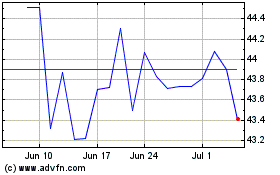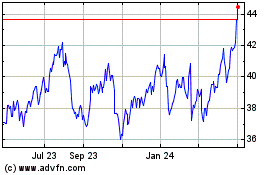HSBC's $2 Billion Share Buyback Falls Short of Expectations
May 04 2018 - 7:25AM
Dow Jones News
By Margot Patrick
HSBC Holdings PLC's new Chief Executive John Flint got off to a
rocky start after costs spiked in the first quarter and a planned
$2 billion share buyback fell short of analyst expectations.
The bank's shares fell 2.8% in London and analysts on a call
peppered Mr. Flint with questions about the rise in costs.
Operating costs in the first three months rose 13%, or 8% after
one-off provisions, outpacing a 3% adjusted revenue rise. Net
profit was $3.09 billion, slightly down from $3.13 billion in
first-quarter 2017.
In an interview, Mr. Flint said the expense rise was the result
of investments in areas such as digital banking, and that HSBC is
still on track to grow revenue faster than costs over the full
year. He said the increase had been built into the bank's internal
plans for the year even though it came as a surprise to
analysts.
"Given the state of the world at the moment and the
opportunities in front of us, there are opportunities for us to
invest in growth," Mr. Flint said. "The fact we're investing in the
business is a sign of strength."
Mr. Flint, with HSBC since college, became CEO in February after
previously heading the bank's retail division and holding other top
roles. Under former CEO Stuart Gulliver HSBC went through a radical
restructuring to improve profits, exiting dozens of businesses and
entire parts of the globe. It is still one of the world's largest
banks with $2.7 trillion in assets.
The appointment of Mr. Flint by Chairman Mark Tucker, also new
to the job since October, was seen as a safe choice, signaling
continuity in the bank's direction.
On Friday, Mr. Flint said HSBC's current strategy is working but
that some tweaks will be announced at or before first-half results
in August. Analysts expect HSBC to grow its insurance and
asset-management arms, possibly through acquisitions or joint
ventures, and exit retail operations in more countries over
time.
Meeting with reporters last week after an investor meeting, Mr.
Flint said the bank can't realistically set any aggressive new
financial targets until it meets current ones such as reaching a
10% return on equity. In 2017, the return was 5.9%. It improved in
the first quarter to 7.5%.
No changes are expected to the bank's pursuit of greater revenue
growth from China, where HSBC has been investing in retail banking
and a new securities business.
The bank on Friday said it would buy back another $2 billion in
shares, adding to buybacks last year. The announcement disappointed
some analysts though since HSBC said it was likely to be the only
one this year. UBS analysts said they had expected $4 billion in
buybacks this year.
Kenan Machado and Chester Yung contributed to this article.
Write to Margot Patrick at margot.patrick@wsj.com
(END) Dow Jones Newswires
May 04, 2018 07:10 ET (11:10 GMT)
Copyright (c) 2018 Dow Jones & Company, Inc.
HSBC (NYSE:HSBC)
Historical Stock Chart
From Mar 2024 to Apr 2024

HSBC (NYSE:HSBC)
Historical Stock Chart
From Apr 2023 to Apr 2024
